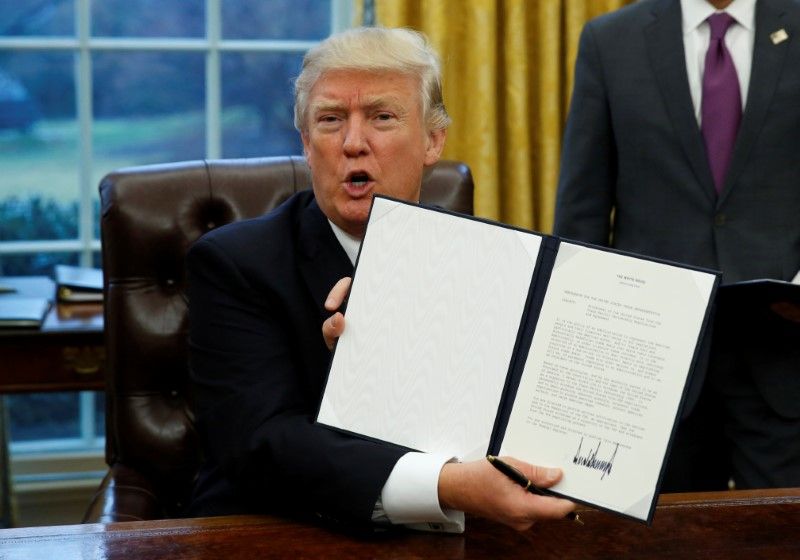
This article originally appeared in Pacific Standard in November 2016. President Donald Trump signed an executive order Monday withdrawing the U.S. from the Trans-Pacific Partnership.
Last week, Donald Trump released a YouTube video outlining key priorities for his administration's first 100 days in office.
In keeping with his campaign promises, the president-elect vowed to "issue our notification of intent to withdraw from the Trans-Pacific Partnership" upon taking office, while also pledging to "negotiate fair, bilateral trade deals that bring jobs and industry back onto American shores."
While Trump has dialed down some of his more inflammatory campaign rhetoric, he has stuck to his hard line on trade, and it now seems highly likely that the United States will not ratify the Trans-Pacific Partnership, the free trade agreement between the U.S. and 11 other countries.
So what does that mean for our economy? In an article published last year on the TPP, I highlighted several expected effects of the agreement on workers in the U.S. and elsewhere:
- The TPP was expected to lower prices on imported consumer goods, which disproportionately benefits low-income workers, who spend a higher proportion of their income on basic necessities.
- Economists predicted the TPP would slightly increase U.S. incomes (by 0.4 percent per year, by 2025), but that the agreement would result in a very small number of jobs lost in import-competing industries. Those losses were expected to be offset by employment gains in other industries. Some workers, however, were likely to face a tough transition, especially "older workers and cities with a narrow industrial base."
- The agreement had the potential to dramatically improve working conditions in less-developed member countries, although critics voiced concerns about enforcement.
On a most basic level, a failure to ratify the TPP simply means these effects simply won't happen. The small economic gains won't be realized, the jobs in import-competing industries won't be lost, and working conditions in less-developed countries will stay the same.
But some TPP advocates argue it's not quite that simple. The TPP was more than just a free trade agreement — it was part of the Obama administration's "Asia pivot," designed to counter China's growing influence.
"There's a broader geo-strategic and leadership issue," says Robert Lawrence, a professor at the Harvard Kennedy School and a trade policy expert. "I think that's where we've had a whole group of Asian leaders and Pacific leaders who've put their neck out, in a sense — who negotiated agreements, some of which were costly in their domestic political terms, and now are going to be disappointed about that. And what it all means is an increase in China's influence in the region."
The TPP is not the only big free trade agreement in play right now. Many of the countries participating in the TPP are also participating in negotiations for the China-led Regional Comprehensive Economic Partnership. Since Trump's election, China has been aggressively moving ahead with the RCEP, and the Wall Street Journal reported that several TPP signatories are now "shifting their focus" to RCEP. Should only the RCEP take effect (as now seems increasingly likely), a number of U.S. industries will struggle to compete in key global markets.
"There are a fair number of those countries with whom we have free trade agreements already. So with respect to Canada, Australia, and Mexico — other things could happen but there isn't a big change," Lawrence says. "The big impact is on Japan. So if the RCEP were to be concluded, it will give duty-free access, presumably, to its members to the Japanese marketplace. The tariffs that the U.S. products will have to pay will be higher than those of our Asian competitors, so, in that sense, we will now be disadvantaged in this major market."
Days before the election, the White House released a report on the economic consequences of not ratifying the TPP, in the event that the RCEP does indeed "fill the void" and take effect. White House economists estimated that 35 different industries—employing almost five million American workers, selling $5.3 billion worth of goods to Japan alone—"would see an erosion of their market access to Japan relative to Chinese firms due to tariff cuts under RCEP." Furthermore, the White House report estimates that "[s]eventy-eight U.S. industries that each export over $1 billion a year in goods to TPP partners and employ nearly 12 million workers in 360,000 business establishments nationwide would fail to see improved market access if TPP is not passed."
"If we don't do it, it's not that we end up at zero — we end up at a negative," Jason Furman, chairman of the president's Council of Economic Advisors, told reporters. "China and other countries would move forward, would conclude agreements, and it would be easier for them to export with each other."
As opposition to both globalization and free trade agreements like the TPP mounts, it's worth remembering that American trade policy doesn't exist in a vacuum. Other countries respond to our decisions, and those responses can have real economic consequences, particularly in the case of the Trans-Pacific Partnership.
It is a loss of potential opportunities for numerous industries," Lawrence says. "And the prospect of discrimination against others, if the RCEP deal goes through."
Pacific Standard tells stories about society's biggest problems, both established and emerging, and the people attempting to solve them. For more stories that matter, sign up for its email newsletter or subscribe now.
Uncommon Knowledge
Newsweek is committed to challenging conventional wisdom and finding connections in the search for common ground.
Newsweek is committed to challenging conventional wisdom and finding connections in the search for common ground.
About the writer
To read how Newsweek uses AI as a newsroom tool, Click here.








